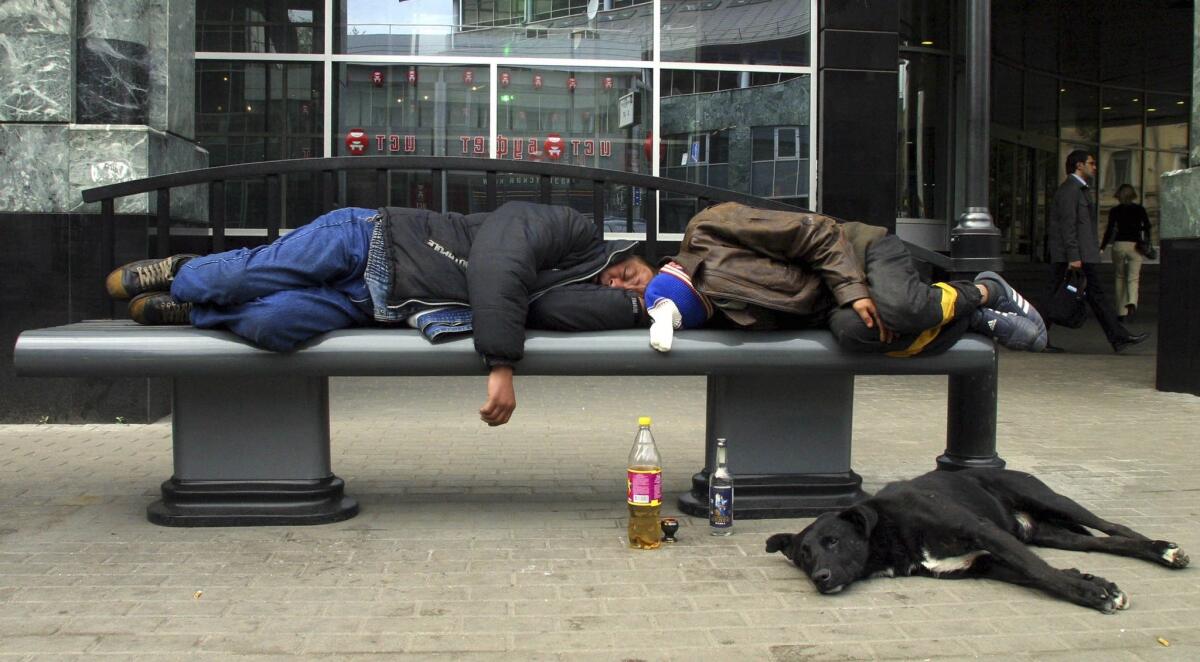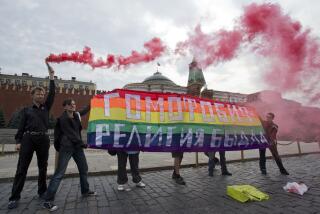Have you heard the one about alcohol-free Wednesdays in Russia?

Before laws banned public consumption of alcohol, two men sleep with bottles of alcohol at hand on a Moscow street in 2005.
- Share via
Russia’s struggle against alcoholism is no laughing matter, but a St. Petersburg lawmaker’s proposal to ban its sale and consumption on Wednesdays is likely to produce more black humor than sobriety.
When Soviet leader and notorious teetotaler Mikhail S. Gorbachev declared war on drunkenness in 1985 with vodka production cuts and price increases, the country’s legions of abusers turned to imbibing perfume and jet fuel and any other alcohol-containing substance they could get their hands on.
Poisoning deaths soared, fist fights broke out at barren liquor stores and little progress was made in weaning Russians from drinking before the well-intentioned health crusade was abandoned.
NEWSLETTER: Get the day’s top headlines from Times Editor Davan Maharaj >>
The main result of Gorbachev’s hated sukhoi zakon -- dry law -- was to spur an eruption of jokes and ridicule:
A man waiting in a long line to buy vodka despairs of the s slow progress and begins ranting against the Kremlin leader, one popular joke began.
“I’m going to the Kremlin and I’m going to kill that #*&^$@! Gorbachev!” he vows as he stalks off, leaving his place in line.
An hour later he returns to the store, to the surprise of those still waiting.
“So, did you shoot him?” one man asks.
“No,” says the would-be assassin. “The line to do that was even longer!”
Russia’s health crisis from alcohol overconsumption afflicts the population with one of the lowest life expectancies and highest suicide rates in the world, not to mention the cost of medical care and lost production.
Lawmaker Andrey Anokhin, from Russia’s imperial capital, last week proposed a more gentle approach to cutting consumption. He suggested that regional officials in St. Petersburg and Moscow begin with a weekly “Temperance Day” on Wednesdays, as well as reduced hours for alcohol sales the rest of the week.
Both cities have already imposed limits on when alcohol can be sold and where it can be consumed, with sales suspended from 11 p.m. to 8 a.m. and drinking in public venues -- a ubiquitous problem until a few years ago -- strictly prohibited.
Anokhin’s bill would further narrow the sales window, banning alcohol purchases from 10 p.m. to 11 a.m., with some exceptions for bars and restaurants.
The deputy from the centrist Fair Russia party proposes Wednesday as the day of sobriety as it is in the middle of the work week, when he believes people should be focused on their jobs, school and home life. Wednesday is also the traditional day of fasting among the Russian Orthodox faithful.
Anokhin’s bill has yet to be taken up for debate, and there has been little rallying behind it among other lawmakers. Reports that a Moscow politician had joined Anokhin’s campaign spurred immediate denial, the Associated Press reported. That hints at the uphill battle the legislation is likely to face, even as the government tries to rein in alcohol-fueled disorderly conduct.
A member of the Russian parliament’s upper house, Anton Belyakov of the Federation Council, has submitted a bill to raise the nationwide drinking age from 18 to 21, the RBC news agency reported last month. It, too, has yet to be scheduled for discussion or a vote.
Russia’s consumer protection agency, Rospotrebnadzor, immediately endorsed the call to restrict young Russians’ drinking, citing health statistics showing an alarming trend toward underage consumption.
One in three teenage boys and 20% of teenage girls drink alcoholic beverages at least every other day, the consumer watchdog reported, according to the Tass news agency.
“The task of prevention of alcohol addiction is coming to the fore in Russia, where about 500,000 alcohol-related deaths are reported a year,” the report said. “Some experts put the number of alcohol addicts in Russia at about 5 million, or 3.5% of the entire population.”
Soviet-era estimates of alcoholism were much higher, with some suggesting that more than half of all men drank to excess on a regular basis.
Russia ranks 153rd in the world in life expectancy, according to the CIA World Factbook, with women averaging 70 years of life and men expected to live to 64 on average, an improvement from 20 years ago when male life expectancy fell below 60.
Follow @cjwilliamslat for the latest international news 24/7
ALSO:
Activist organizations struggling to survive under Russian restrictions
Russian athletes kicked out of competition for alleged drunken behavior
More to Read
Sign up for Essential California
The most important California stories and recommendations in your inbox every morning.
You may occasionally receive promotional content from the Los Angeles Times.










